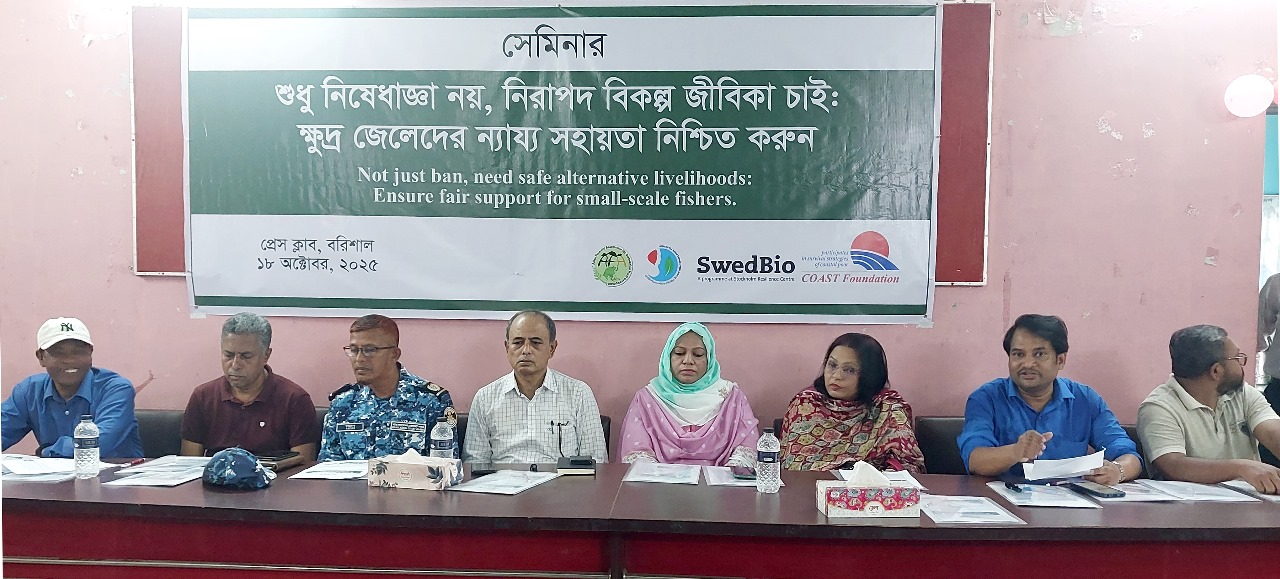01/30/2026

Give livelihood protection and dignity for small-scale fishers during fishing bans
Md. Jahirul Islam | Published: 2025-10-18 18:40:11

COAST Foundation today organized a divisional seminar at the Barishal Press Club titled “Not Just Imposing Fishing Bans, Ensure Safe and Sustainable Livelihoods for Small-scale Fishers.”
Speakers highlighted the hardships of small-scale fishers during the ban period, emphasizing that government allocations are insufficient and often delayed, covering less than 30% of a household’s monthly expenditure. Women and children in fishing families are the hardest hit, as income loss and food shortages often lead to rising domestic violence and debt dependency.
According to a recent COAST Foundation field assessment, 38% of women in fishing families in riverine areas of Barishal experience domestic violence during the fishing ban, primarily driven by financial stress and lack of food security.
The situation is even more severe for the Manta community, the floating fishers who live permanently on boats without land or housing. They remain excluded from fisher registration, food support, and social protection programs, despite their full-time dependence on fishing.
Md. Jahirul Islam, District Coordinator, COAST Foundation, presented the keynote paper, noting that 85% of fishers in Barishal depend on river or estuarine fishing, using small trawlers or wooden boats.
During the ban, their average monthly income falls from BDT 15,000 to only 3,000-4,000, while the food aid provided lasts only 10-12 days per family. As a result, most families resort to high-interest informal loans from traders and moneylenders.
Around 60% take temporary daily-wage work, 25% rely on loans, and 15% continue illegal fishing out of desperation.
“Without alternative income, enforcement alone cannot ensure conservation,” he warned.
Sanat Kumar Bhowmik, Deputy Executive Director, COAST Foundation, and moderator of the seminar, said, the government must deliver 40 kg rice and BDT 8,000 to every registered fishing family before each ban starts and ensure at least one member has IGA work. Special vocational training for youth and inclusion of Manta fishers in the national registry are essential.
Md. Jasim Uddin, representative of the Manta community, said, many of us still have no national ID. When Coast Guard patrols pass, the waves overturn our cooking pots. We have no land, no address, and even after death, no place for burial.
Israel Pandit, President of the Small-scale Fishers Association, stated, local fisher representatives should be involved in preparing support lists. That’s the only way real fishers will receive government assistance.
Ismat Ara, District Social Services Officer, said, alternative livelihood initiatives should not be limited to ban periods only. Skills training and interest-free loans must continue year-round, and food support must reach fishers on time.
Meherun Nahar Munni, Deputy Director, Department of Women Affairs, emphasized, women fishers and their children live in extreme conditions on boats, often exposed to storms and flooding. Their safety and livelihood must be prioritized.
Mainuddin, Chief Petty Officer of Bangladesh Coast Guard mentioned that during the 22-day Hilsa ban, every mother Hilsa lays 1-2 million eggs. This sacrifice benefits the whole nation. We will forward these seminar recommendations to higher authorities to ensure that fishers’ food and safety are addressed.
Speakers concluded that over the past five years, Hilsa catch has dropped by 3.4%, signaling urgent need for timely food distribution, inclusive IGA programs, interest-free credit, and fair inclusion of marginalized and floating fishers in government support systems, ensuring that no fishing family goes hungry during conservation bans.
Editor & Publisher : Md. Motiur Rahman
Pritam-Zaman Tower, Level 03, Suite No: 401/A, 37/2 Bir Protik Gazi Dastagir Road, Purana Palton, Dhaka-1000
Cell : (+88) 01706 666 716, (+88) 01711 145 898, Phone: +88 02-41051180-81